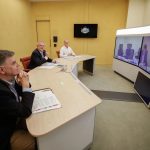Freedom and responsibility

Most people, if asked would be certain that they possessed free-will and they could very well be correct in this assumption. I also believe I have a free will but in order to use it I must be aware of all the pressures around and within me, using some considerable will-power to achieve it.
If we take a close look at our lives, we realise that the majority of our actions are, in fact automatic. The human body is top heavy and therefore prone to falling over, yet we stand, walk and run without difficulty; our brains constantly monitor our position and adjust to keep us upright. When we pick up a glass of water, we do not have to concentrate on the action.
During our childhood, we learned to use our bodies to achieve our goals. As adults, we can drive a car, go shopping, go to work, look after our homes and even bring up our children without thinking about each action. But let’s look more closely at these activities. Virtually everything we do during our waking hours is done because of a ‘nudge’ from our environment.
We cook and eat because our bodies tell us we need nourishment, we sleep because we are tired, we visit friends because our brains tell us we need to communicate, or we are bored or because we believe they need support, comfort or whatever. How often have we done something and then asked ourselves ‘why did I do (say) that?’ Something made me do it.
According to the prediction processing theory, the brain is a probability machine that constantly makes predictions about the world and then updates them based on incoming data. The result is that we experience the world not as raw sensory inputs, but instead as a meld of such data with our predictions and expectations. This would mean we have multilayered neural networks, where predictions flow down from higher cortical layers, while error signals rise from the bottom.
The human brain is a decision-making device. It gathers information from all sorts of sources to make decisions from moment to moment. Information is gathered, computed, a decision is made and then you get the sensation of conscious experience.
So what is freewill? It is the capacity of agents to choose between different possible courses of action unimpeded. It is closely linked to the concepts of moral responsibility, praise, culpability, sin, and other judgements which apply only to actions that are freely chosen. It is also connected with the concepts of advice, persuasion, deliberation, and prohibition.
Traditionally, only actions that are freely willed are seen as deserving credit or blame. Whether free will exists, what it is and the implications of whether it exists or not are some of the longest running debates of philosophy and religion. Some conceive of free will as the right to act outside of external influences or wishes, the capacity to make choices undetermined by past events.
It has become possible to study the living brain, and researchers can now watch the brain’s decision-making process at work. An experiment was conducted by Benjamin Libet in the 1980s, in which he asked each subject to choose a random moment to flick their wrist while he measured the associated activity in their brain; in particular, the build-up of electrical signal called the readiness potential.
Although it was well known that the readiness potential reliably preceded the physical action, Libet asked whether it could be recorded before the conscious intention to move. To determine when subjects felt the intention to move, he asked them to watch the second hand of a clock. After making a movement, the volunteer reported the time on the clock when they first felt the conscious intention to move; this became known as Libet’s W time.
He found that the unconscious brain activity of the readiness potential leading up to subjects’ movements began approximately half a second before the subject was aware of a conscious intention to move.
These studies of the timing between actions and the conscious decision bear upon the role of the brain in understanding free will. A subject’s declaration of intention to move a finger appears after the brain has begun to implement the action, suggesting to some that unconsciously the brain has made the decision before the conscious mental act to do so. Some believe the implication is that free will was not involved in the decision and is an illusion.
The first of these experiments reported the brain registered activity related to the move about 0.2 s before movement onset. However, these authors also found that awareness of action was anticipatory to activity in the muscle underlying the movement; the entire process resulting in action involves more steps than just the onset of brain activity. The bearing of these results upon notions of free will appears complex.
Schopenhauer elaborated on the topic in his essay On the Freedom of the Will. In this work, he stated, “You can do what you will, but in any given moment of your life you can will only one definite thing and absolutely nothing other than that one thing.”
In his book Free Will, philosopher and neuroscientist Sam Harris argues that free will is an illusion, stating that “thoughts and intentions emerge from background causes of which we are unaware and over which we exert no conscious control.”
Thirteenth century philosopher Thomas Aquinas viewed humans as pre-programmed (by virtue of being human) to seek certain goals, but able to choose between routes to achieve these goals (our Aristotelian telos). His view has been associated with both compatibilism and libertarianism.
In facing choices, he argued that humans are governed by intellect, will, and passions. The will is “the primary mover of all the powers of the soul… and it is also the efficient cause of motion in the body.” Choice falls into five stages: (i) intellectual consideration of whether an objective is desirable, (ii) intellectual consideration of means of attaining the objective, (iii) will arrives at an intent to pursue the objective, (iv) will and intellect jointly decide upon choice of means (v) will elects execution.
Free will enters as follows: Free will is an “appetitive power”, that is, not a cognitive power of intellect (the term “appetite” from Aquinas’s definition “includes all forms of internal inclination”). He states that judgement “concludes and terminates counsel. Now counsel is terminated, first, by the judgement of reason; secondly, by the acceptation of the appetite [that is, the free-will].”
But the individual, the person, is not will as thing-in-itself, but is phenomenon of the will, is as such determined, and has entered the form of the phenomenon, the principle of sufficient reason. Hence we get the strange fact that everyone considers himself to be quite free, even in his individual actions, and imagines he can at any moment enter upon a different way of life…
However, through experience he finds to his astonishment that he is not free, but liable to necessity; that notwithstanding all his resolutions and reflections he does not change his conduct, and that from the beginning to the end of his life he must bear the same character that he himself condemns, and, as it were, must play to the end the part he has taken upon himself.”
In alien hand syndrome, the afflicted individual’s limb will produce unintentional movements without the will of the person. The affected limb effectively demonstrates “a will of its own.’ The sense of agency does not emerge in conjunction with the overt appearance of the purposeful act even though the sense of ownership in relationship to the body part is maintained. This phenomenon corresponds with an impairment in the premotor mechanism manifested temporally by the appearance of the readiness potential recordable on the scalp several hundred milliseconds before the overt appearance of a spontaneous willed movement.
Using functional magnetic resonance imaging (fMRI) with specialized multivariate analyses to study the temporal dimension in the activation of the cortical network associated with voluntary movement in human subjects, an anterior-to-posterior sequential activation process beginning in the supplementary motor area on the medial surface of the frontal lobe and progressing to the primary motor cortex and then to parietal cortex has been observed.
Emily Pronin has argued that the subjective experience of free will is supported by the introspection illusion. This is the tendency for people to trust the reliability of their own introspections while distrusting the introspections of other people. The theory implies that people will more readily attribute free will to themselves rather than others.
This prediction has been confirmed by three of Pronin and Kugler’s experiments. When college students were asked about personal decisions in their own and their roommate’s lives, they regarded their own choices as less predictable. Staff at a restaurant described their co-workers’ lives as more determined (having fewer future possibilities) than their own lives. When weighing up the influence of different factors on behaviour, students gave desires and intentions the strongest weight for their own behaviour, but rated personality traits as most predictive of other people.
Studies indicate that peoples’ belief in free will is inconsistent. Emily Pronin and Matthew Kugler found that people believe they have more free will than others.
Studies also reveal a correlation between the likelihood of accepting a deterministic model of mind and personality type. For example, Adam Feltz and Edward Cokely found that extrovert personalities are more likely to dissociate belief in determinism from belief in moral responsibility.
Roy Baumeister and colleagues reviewed literature on the psychological effects of a belief (or disbelief) in free will and found that most people tend to believe in a sort of “naive compatibilistic free will”.
The researchers also found that people consider acts more “free” when they involve a person opposing external forces, planning, or making random actions. Notably, the last behaviour, “random” actions, may not be possible; when participants attempt to perform tasks in a random manner (such as generating random numbers), their behaviour betrays many patterns. This is possibly why random number generators are so notoriously difficult to design.
The outcome of these ramblings is that we tend to think we have more free-will than the next person in the same way we are better drivers, parents, people than most others. No wonder we get into so many wars.

Alan Stevenson spent four years in the Royal Australian Navy; four years at a seminary in Brisbane and the rest of his life in computers as an operator, programmer and systems analyst. His interests include popular science, travel, philosophy and writing for Open Forum.












